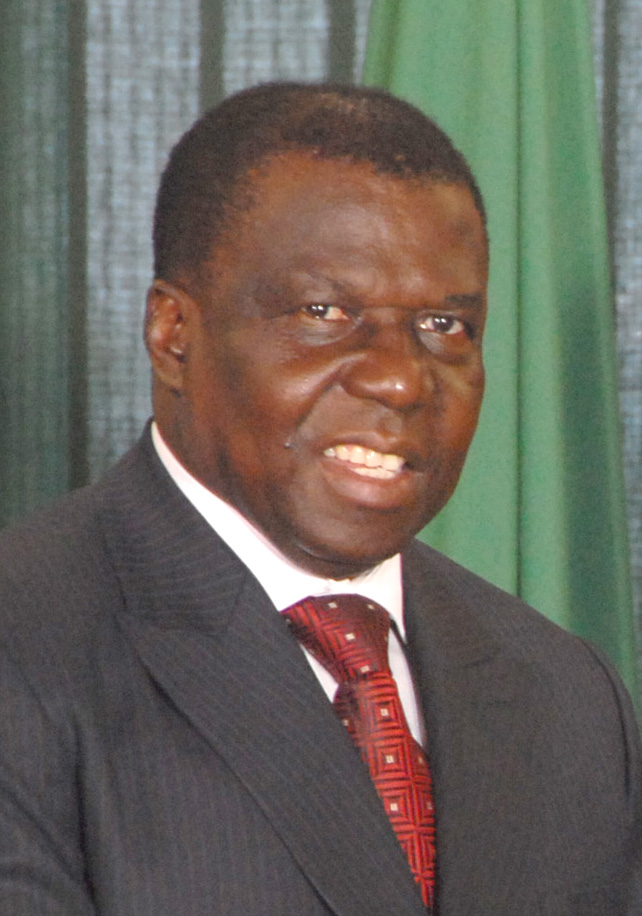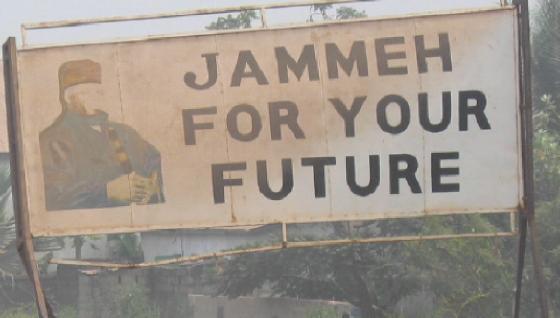|
Movement Of Democratic Forces Of Casamance
The Movement of Democratic Forces of Casamance (french: Mouvement des forces démocratiques de Casamance; MFDC) is the main separatist movement in the Casamance region of Senegal, founded in 1982. It was supported by Guinea-Bissau President João Bernardo Vieira until he was overthrown in 1999. It relies mainly on the Jola people. Its armed wing was formed in 1985 and is called Atika (Diola for "the combatant"). Its leader was Father Augustin Diamacoune Senghor, who died on 13 January 2007. Senghor signed a peace agreement with the government of Senegalese President Abdoulaye Wade in 2004. However, several factions of the MFDC refused to participate in the peace deal and continued their fighting. This division has deeply divided Casamance's independence movement. Involvement in the Gambian constitutional crisis The movement was rumored to have involved itself militarily in the 2016–2017 Gambian constitutional crisis and the subsequent ECOWAS military intervention in t ... [...More Info...] [...Related Items...] OR: [Wikipedia] [Google] [Baidu] |
Casamance Conflict
The Casamance conflict is an ongoing low-level conflict that has been waged between the Government of Senegal and the Movement of Democratic Forces of Casamance (MFDC) since 1982. On May 1, 2014 the leader of the MFDC sued for peace and declared a unilateral ceasefire. The MFDC has called for the independence of the Casamance region, whose population is religiously and ethnically distinct from the rest of Senegal. The bloodiest years of the conflict were during the 1992–2001 period and resulted in over a thousand battle related deaths. On December 30, 2004 an agreement was reached between the MFDC and the government which promised to provide the voluntary integration of MFDC fighters into the country's paramilitary forces, economic recovery programmes for Casamance, de-mining and aid to returning refugees. Nevertheless, some hard-line factions of the MFDC soon defected from elements of the MFDC who had signed the agreement and no negotiations took place following the breakdown o ... [...More Info...] [...Related Items...] OR: [Wikipedia] [Google] [Baidu] |
João Bernardo Vieira
João Bernardo "Nino" Vieira (; 27 April 1939 – 2 March 2009) was a Bissau-Guinean politician who was the President of Guinea-Bissau from 1980 to 1999, except for a three-day period in May 1984, and from 2005 to 2009. After seizing power from President Luís Cabral in a military coup in 1980, Vieira ruled as part of the Military Council of the Revolution until 1984, when civilian rule was returned. Opposition parties were allowed in 1991, and Vieira won a multiparty presidential election in 1994. He was ousted at the end of the 1998–1999 civil war and went into exile. He made a political comeback in 2005, winning that year's presidential election. Vieira was killed by soldiers on 2 March 2009, apparently in retaliation for a bomb blast that killed Guinea-Bissau's military chief General Batista Tagme Na Waie hours before. The military officially denied these allegations after unidentified Army officials claimed responsibility of Vieira for Na-Waie's death. Viei ... [...More Info...] [...Related Items...] OR: [Wikipedia] [Google] [Baidu] |
Political Parties Established In 1982
Politics (from , ) is the set of activities that are associated with making decisions in groups, or other forms of power relations among individuals, such as the distribution of resources or status. The branch of social science that studies politics and government is referred to as political science. It may be used positively in the context of a "political solution" which is compromising and nonviolent, or descriptively as "the art or science of government", but also often carries a negative connotation.. The concept has been defined in various ways, and different approaches have fundamentally differing views on whether it should be used extensively or limitedly, empirically or normatively, and on whether conflict or co-operation is more essential to it. A variety of methods are deployed in politics, which include promoting one's own political views among people, negotiation with other political subjects, making laws, and exercising internal and external force, including w ... [...More Info...] [...Related Items...] OR: [Wikipedia] [Google] [Baidu] |
Separatism In Senegal
Separatism is the advocacy of cultural, ethnic, tribal, religious, racial, governmental or gender separation from the larger group. As with secession, separatism conventionally refers to full political separation. Groups simply seeking greater autonomy are not separatist as such. Some discourse settings equate separatism with religious segregation, racial segregation, or sex segregation, while other discourse settings take the broader view that separation by choice may serve useful purposes and is not the same as government-enforced segregation. There is some academic debate about this definition, and in particular how it relates to secessionism, as has been discussed online. Separatist groups practice a form of identity politics, or political activity and theorizing founded in the shared experiences of the group's members. Such groups believe attempts at integration with dominant groups compromise their identity and ability to pursue greater self-determination. However, econo ... [...More Info...] [...Related Items...] OR: [Wikipedia] [Google] [Baidu] |
Rebel Militia Groups In Africa
A rebel is a participant in a rebellion. Rebel or rebels may also refer to: People * Rebel (given name) * Rebel (surname) * Patriot (American Revolution), during the American Revolution * American Southerners, as a form of self-identification; see Southern United States * DJ Rebel (born 1984), or simply Rebel, Belgian DJ * Johnny Reb, or Johnny Rebel, the national personification of the Southern states of the United States * In professional wrestling: **Rebel (wrestler), American professional wrestler ** Rockin Rebel, American professional wrestler ** The Rebel, a nickname for American professional wrestler Dick Slater Organizations and brands * Rebel (company), a sport equipment retailer in Australia and New Zealand * Rebel (entertainment complex), an entertainment complex in Toronto, Ontario, Canada * Rebel (Denmark), a Danish youth organization * Murphy Rebel, an airplane model by Murphy Aircraft * REBEL (chess), a chess program * Rebel (train), a type of train * R ... [...More Info...] [...Related Items...] OR: [Wikipedia] [Google] [Baidu] |
Greenwood Publishing Group
Greenwood Publishing Group, Inc. (GPG), also known as ABC-Clio/Greenwood (stylized ABC-CLIO/Greenwood), is an educational and academic publisher (middle school through university level) which is today part of ABC-Clio. Established in 1967 as Greenwood Press, Inc. and based in Westport, Connecticut, GPG publishes reference works under its Greenwood Press imprint, and scholarly, professional, and general interest books under its related imprint, Praeger Publishers (). Also part of GPG is Libraries Unlimited, which publishes professional works for librarians and teachers. History 1967–1999 The company was founded as Greenwood Press, Inc. in 1967 by Harold Mason, a librarian and antiquarian bookseller, and Harold Schwartz who had a background in trade publishing. Based in Greenwood, New York, the company initially focused on reprinting out-of-print works, particularly titles listed in the American Library Association's first edition of ''Books for College Libraries'' (1967), unde ... [...More Info...] [...Related Items...] OR: [Wikipedia] [Google] [Baidu] |
Politics Of Senegal
Politics in Senegal takes place within the framework of a presidential democratic republic. The President of Senegal is the head of state and government. Executive power in Senegal is concentrated in the president's hands. While legislative power is technically vested in both the government and the parliament, the parliament rarely introduces legislation or votes down legislation proposed by the government. Similarly, although the Judiciary is theoretically independent of the executive and the legislature, the executive branch seems to exert undue control over the judiciary. Senegal is one of the few African states that has never experienced a coup d'état or exceptionally harsh authoritarianism. Léopold Senghor, the first president after independence, resigned in 1981, handing over the office of president to his Prime Minister, Abdou Diouf. The present president, Macky Sall, was elected in competitive democratic elections in March 2012. President Sall was re-elected in 201 ... [...More Info...] [...Related Items...] OR: [Wikipedia] [Google] [Baidu] |
Yahya Jammeh
Yahya Abdul-Aziz Jemus Junkung Jammeh (born 25 May 1965) is a Gambian politician and former military officer who was the leader of The Gambia from 1994 to 2017, firstly as chairman of the Armed Forces Provisional Ruling Council (AFPRC) from 1994 to 1996 and then as President of the Gambia from 1996 to 2017. Jammeh was born in Kanilai, in The Gambia, and is a Muslim of the Jola ethnic group. He attended Gambia High School in Banjul from 1978 to 1983 and served in the Gambian National Gendarmerie from 1984 to 1989. He was then commissioned as an officer of the Gambian National Army, commanding the Military Police from 1992 to 1994. In July 1994, he led a bloodless coup d'etat that overthrew the government of Sir Dawda Jawara and installed himself as chairman of AFPRC, a military junta, and ruled by decree until his election as president in 1996. Jammeh was re-elected as president in 2001, 2006 and 2011, but lost to Adama Barrow in 2016. His time in office saw the authorit ... [...More Info...] [...Related Items...] OR: [Wikipedia] [Google] [Baidu] |
2016–2017 Gambian Constitutional Crisis
The Gambian constitutional crisis occurred following Gambian presidential election, 2016, presidential elections in December 2016, in which challenger Adama Barrow achieved an upset victory over longtime incumbent Yahya Jammeh. It eventually concluded after a military intervention by the Economic Community of West African States (ECOWAS) led to Jammeh’s departure from the country. Although Jammeh first accepted the victory of Adama Barrow on 1 December, he rejected the election results days later. Jammeh called for the election to be annulled, and appealed to the Supreme Court of the Gambia, Supreme Court, which refused to rule on the matter. He then deployed troops to the capital of Banjul and the city of Serekunda. The National Assembly, where Jammeh’s Alliance for Patriotic Reorientation and Construction held an absolute majority, used emergency measures to extend Jammeh’s rule. The United Nations and Economic Community of West African States, ECOWAS, an organisation ... [...More Info...] [...Related Items...] OR: [Wikipedia] [Google] [Baidu] |
Abdoulaye Wade
Abdoulaye Wade (born 29 May 1926) Encyclopedia of the Nations. Retrieved February 28, 2007 is a ese politician who was President of Senegal from 2000 to 2012. He is also the Secretary-General of the Senegalese Democratic Party (PDS), having led the party since it was founded in 1974.''Profiles of People in Power: The World's Government Leaders'' (2003), page 457. A long-time opposition leader, he ran for President four ... [...More Info...] [...Related Items...] OR: [Wikipedia] [Google] [Baidu] |



.jpg)

